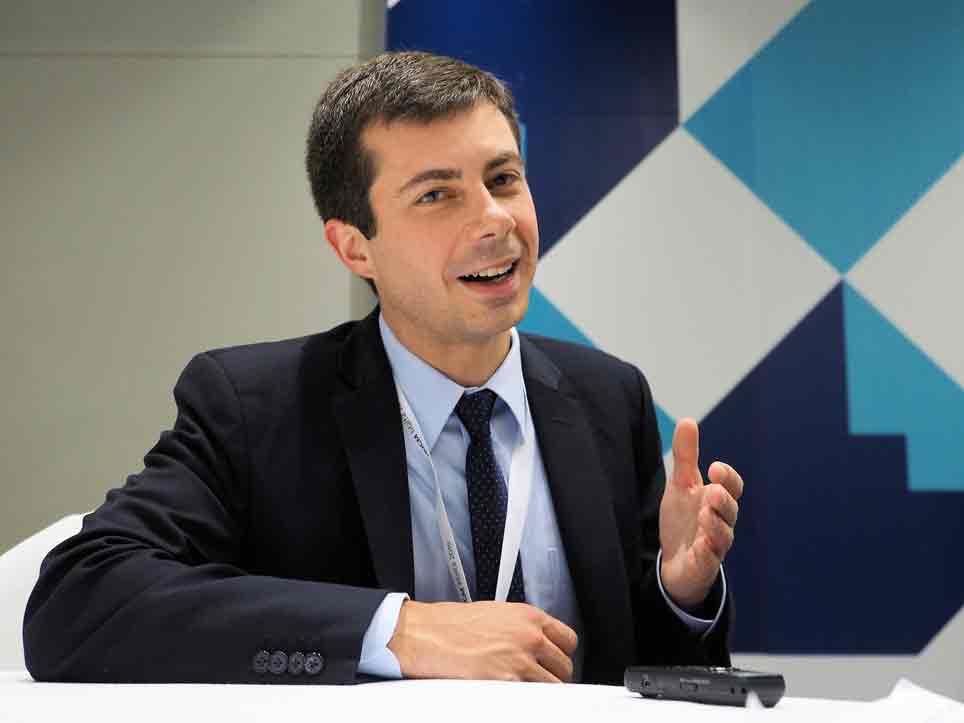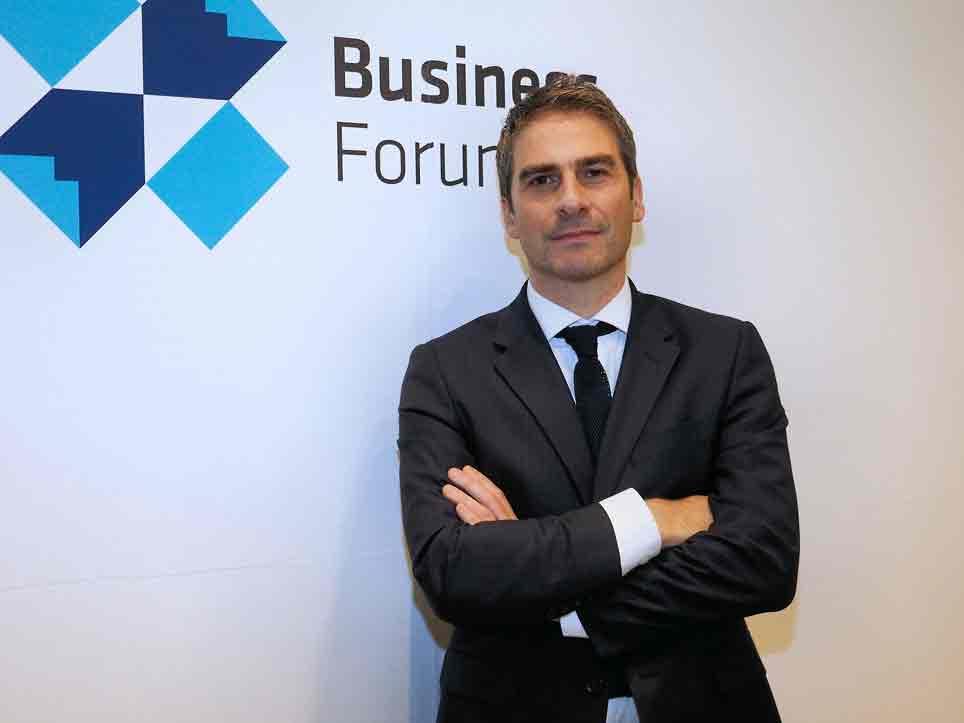Two people of Maltese descent have are leaving their mark in the technology and digital business sectors, pushing boundaries in the USA and the UK, one a politician, and the other a CEO of a hybrid organisation.
Both were attending the Commonwealth Business Forum at the Hilton, here in Malta.
Pete Buttigieg is Mayor of South Bend Indiana, USA, a city of around 100,000 people located an hour and a half away from Chicago in the American Mid-West. His father had originally moved to the USA to read for a PHD.
Mayor Buttigieg described himself as possibly the only US politician of Maltese descent. He is trying to transform his city into what he calls a "beta city", utilising smart technology.
"We created smart sewers, and are the first city in the world to move waste-water management into the cloud". The city is now able to monitor and actively control the wastewater collection system. It has helped cut down on sewer back-ups and overflows.
"We've used technology to enable local government to be more transparent. For example any time my government cuts a cheque and makes any payment, you can go online to see how much and to whom. Measures like this build confidence and allows us to serve residence better and allows us to succeed in our fundamental mission which is to allow people to achieve their goal in life and in business".
Such technology sounds quite costly, and Mayor Buttigieg explained that he is always looking for investment which "pays back. Whether its energy efficiency that pays for itself often within 5-10 years, or this sewer implementation which cost us a few million upfront but has saved us over a hundred million in avoided capital. This means we wouldn't need to build as much in new infrastructure. You have to look at it in a comprehensive way".

"My primary interest is using technology to improve people's lives. If we can learn a lesson from New Zealand or the Bahamas here at the Forum that I can use in South Bend, then that is a great benefit for me".
"Every city in the world is under pressure to deliver more with less resources. We have very little tax-payer dollars and this is true in any community. In order to offer some new service, you either need to reduce service elsewhere or use technology to do things more efficiently".
A big issue for his city relates to retaining and developing jobs in technology-related fields. "By partnering with start-up companies connected with universities, we've been able to become an 'early customer' for newly-created companies using intellectual capital created at the university. The result is that when an idea turns into a company, it creates jobs - and by being an early user, even on an experimental basis, makes it more likely for that company to establish itself in our home town, which fuels the local economy. The broader lesson for any Commonwealth community is that opportunity exists to use the resources around you, whether it's an academic institution or the private sector, connecting that with the needs of government in order to grow".
Everyone at the Commonwealth Business Forum was concerned about their own workforce, and it is something "that is true across the Commonwealth as it is in the States. People are changing careers, not to mention jobs, every few years and this is not going to stop any time soon".
He was excited about a particular presentation at the meeting, regarding the deployment of a small kit which taught children how to build their own computers, then taught them how to code. "I immediately thought of our own underprivileged youth, where learning coding skills early could help them in their future".
Turning to the Transatlantic Trade and Investment Partnership (TTIP), he expressed the need to ensure the benefits for American workers. "There needs to be the right plan going forward regarding adjustment for any workers affected. We are still evaluating how it will affect a community like mine. What I will say, is that that the latest expansion of auto-jobs in our community is Mercedes, hiring workers in Indiana, to produce vehicles being sold to the Chinese market. So there are ways for workers to succeed in globalisation. We need more development that facilitates that kind of growth so that we are beneficiaries and not victims of the globalising economy, especially when it comes to the manufacturing sector".

The Digital economy
Gerard Grech, CEO of Tech City UK, lived in Gozo until the age of 13 with his parents.
Living in Gozo in his early years, he had what he describes as a perfect childhood upbringing. "Being brought up in an island like Gozo, you learn to become extremely adaptable and essentially entrepreneurial".
"My parents had a broad vision for our family. We left for London when I was 13 and studied engineering. I moved into the music business, became a journalist. I then read for an MBA, later joining Orange in London, France Telecom in Paris and then Nokia in New York".
Tech City UK is a hybrid organisation that sits between the tech community and the British government. It is there to accelerate growth of digital economy by delivering programmes to help businesses grow, convene policy makers in government as well as tech entrepreneurs to ensure the challenges they face are truly understood, and to advocate on behalf of digital entrepreneurs, he explained.
The organisation brought 12 companies "to showcase the best of British technology" at the Commonwealth Business Forum.
"One programme Tech City runs is called the Digital Business Academy (an online academy), where anyone can learn the latest skills in digital technology, whether its building a digital product or knowing how to use social media for their business. The Academy was built in conjunction with University College London, Cambridge Judge Business School and with people who have helped build businesses".
The organisation also runs the Tech Nation Visa scheme, "where we endorse people from around the world to join the UK's group of companies. We endorse these people and submit their applications to the Home Office. It's then up to the Home Office to issue the visa or not".
Another programme the organisation runs is called Future Fifty, "where we connect businesses at the forefront of their expertise, with government, helping them grow as quickly as possible. We help connect them to analysts and investors, thus we are increasing connectivity.

Two kinds of digital businesses
There are two kinds of businesses, indigenous digital businesses, and those belonging to traditional industry. "Indigenous digital businesses that start out as a digital business understand they need to grow their business internationally. Then there's the traditional industry businesses transforming themselves with digital technology".
When looking at the digital economy, "governments need to ensure they are creating the right conditions for growth of indigenous digital businesses, while also ensuring that established businesses and corporations understand the value of transforming their business using digital technology. It's also about increasing their confidence to make the leap they need technologically, not only to survive the transformation, but also to build new businesses on top of the current businesses they own".
Asked whether micro-enterprises can adapt to the digital economy, he said: "we are living in a network economy. I visited a company at the University of Malta. Last year they had four people, and built a game digitally using intellectual property. Now they've just hired their eighth employee last week. They are a completely network-based organisation and they've just now created a physical product".
He explained the importance of being able to adapt to any platform, whether it's physical or digital. "We are very much aware that this new economy is creating jobs out of non-resourced based facilities, and that's why universities and colleges need to really foster the growth of these kinds of businesses".
The skills gap
Turning to the skills gap, he believes this is due to the speed by which technological change is taking place, and that some countries find it hard to keep up. "This needs to be tackled on a number levels. We need to emphasise creativity, empathy and problem solving for students up to the age of 16. The workforce needs to be adaptable, and though we might have an idea of what skills would be required ten years down the line, we wouldn't know for sure. Thus the more adaptable a workforce is, the more likely that country will be competitive enough in dealing with technological change"
He mentioned the idea of introducing coding into schools, and even going as far as introducing robotics.
"In some instances where a skills gap is present, then experts must be brought in from abroad".

Advice for small businesses
Mr Grech had some advice for small businesses that have not yet shifted to the digital economy.
"First of all, have a website, but make sure it's relevant and useful to the person who wants information about you. Then, think about how you can improve your process through utilising the latest technologies and tools. Whether its logistics, selling online, whatever it might be, I guarantee there's an app or a piece of technology that can enable the process to be faster, cheaper and better".
"Aside from the basics, I recommend engaging in the start-up community. There are many tools that allow businesses to cut down on time, in the way they deal with their expenses and how they prepare reports for investors. I'm referring to processes and systems that can help a company be a lot more productive".
The beginning of the network economy
"If you look at the invention of the printing press, there was a lot of fear surrounding it, but its contribution to society is unquestionable. It instigated many mini-revolutions and allowed people to distribute flyers and information quickly".
"Right now, we are probably at the very beginning of the network economy and the effect it might have. So scepticism does exist, but there's a lot of opportunity. Governments must do everything they can through creating the right policy and business environment for digital business to grow, while taking a phased and measured approach about that change. It has a role to play in striking the right balance between accelerating the growth of disruptive technologies while ensuring that established industries as well as citizens move with that change. If it doesn't do it quickly enough, there's a danger that trust between citizen and government would decrease".